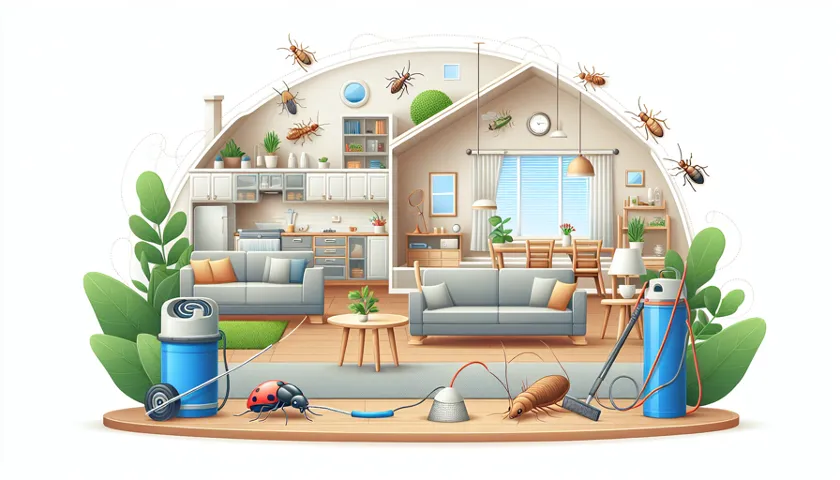Unveiling the Latest in Pest Control
Unlock the Hidden Tactics of Expert Pest Control: Dive into a World of Innovative Strategies and Insider Tips to Safeguard Your Home and Family's Health
list of our Latest blogs

The Ultimate Guide to Effective Residential Pest Control
The Ultimate Residential Pest Control Guide
Introduction
Pests can be a nuisance in any home, causing damage, spreading diseases, and creating an uncomfortable living environment. Effective residential pest control is essential to protect your home and ensure the well-being of your family. In this comprehensive guide, we will explore various aspects of pest control, from prevention to treatment and ongoing maintenance. Whether you're dealing with ants, roaches, bed bugs, or any other common household pests, this guide will provide you with practical tips and strategies to achieve long-term pest control success. So, let's dive in and take control of your home's pest situation!
Prevention
• Keep your home clean and tidy to eliminate potential food sources for pests.
• Seal cracks and gaps in walls, floors, and foundations to prevent pests from entering your home.
• Store food in airtight containers to prevent attracting pests.
• Remove standing water and fix any leaks to eliminate moisture that attracts pests.
• Trim trees and bushes away from your home to prevent pests from using them as entry points.
Signs of Infestation
• Unusual droppings or urine stains.
• Chewed or gnawed furniture, wiring, or other materials.
• Strange odors, particularly musty or rotten smells.
• Visible pests, such as ants, roaches, or rodents.
• Scratching or scurrying sounds in walls or ceilings.
Treatment
If you suspect an infestation, it's important to take action promptly. Here are some steps to effectively eliminate pests:
1. Identify the type of pest you're dealing with to determine the most appropriate treatment method.
2. Consult with a professional pest control service to develop a customized treatment plan.
3. Follow the recommended treatment methods, which may include baits, traps, or chemical sprays.
4. Regularly monitor the effectiveness of the treatment and make adjustments as necessary.
5. Take preventive measures to ensure long-term pest control success.
Ongoing Maintenance
Pest control is an ongoing process. Here are some tips for maintaining a pest-free home:
• Keep your home clean and free of clutter.
• Regularly inspect and repair any cracks or gaps in your home's exterior.
• Trim trees and bushes regularly to prevent pests from using them as pathways.
• Dispose of garbage properly in sealed containers.
• Store firewood away from your home to prevent pests from nesting in it.
By following these tips and strategies, you can achieve long-term pest control success and create a comfortable living environment for you and your family. Don't let pests take over your home - take control today!
The Ultimate Guide to Effective Residential Pest Control
The target audience for this blog post is homeowners who are seeking effective solutions for residential pest control. Whether they are dealing with existing pest problems or want to prevent infestations in the future, this blog post will provide valuable information and actionable advice suitable for readers with varying levels of knowledge and experience in pest control.
As a homeowner, it can be frustrating and overwhelming to deal with pests in your living space. From ants and roaches to mice and spiders, these unwanted guests can make your home feel less comfortable and safe. That's where effective residential pest control comes in. In this blog post, we will explore different strategies and techniques that homeowners can use to tackle pest problems head-on.
Prevention Measures
One of the most important aspects of residential pest control is prevention. By taking proactive steps, homeowners can minimize the risk of infestations and keep pests at bay. Some effective prevention measures include:
• Sealing Cracks and Crevices: Pests often enter homes through small cracks and crevices. By sealing these entry points, homeowners can prevent pests from gaining access to their living spaces.
• Storing Food in Airtight Containers: Proper food storage is crucial in preventing pests like ants and rodents from being attracted to your home. By keeping food in airtight containers, you can deny pests easy access to their food source.
• Regular Deep Cleaning: Regular cleaning helps eliminate potential food and water sources for pests. By keeping your home clean and clutter-free, you can reduce the likelihood of pest infestations.
Natural and Non-Toxic Repellents
In addition to prevention measures, homeowners can also consider using natural and non-toxic repellents as alternatives to toxic chemicals. These repellents are safer for both humans and the environment while still effectively deterring pests. Some examples of natural and non-toxic repellents include:
• Essential Oils: Certain essential oils, such as peppermint, lavender, and eucalyptus, have been found to repel pests like ants, mosquitoes, and spiders. Mixing a few drops of these oils with water and spraying them around the house can help keep pests away.
• Diatomaceous Earth: Diatomaceous earth is a natural substance that can be used to control pests like bed bugs and cockroaches. It works by dehydrating the pests, ultimately killing them. Sprinkling diatomaceous earth in areas where pests are likely to hide can be an effective method of pest control.
• Ultrasonic Pest Repellers: Ultrasonic pest repellers emit high-frequency sound waves that are inaudible to humans but irritating to pests. Placing these devices strategically around your home can help repel pests without the use of chemicals.
Pest Control Techniques for Common Household Bugs
Understanding the habits and behaviors of common household bugs can help homeowners effectively target and eliminate these pests. Here are some specific pest control techniques for common household bugs:
Ants
• Identify and eliminate ant trails by cleaning surfaces with vinegar or soapy water.
• Use ant baits or natural ant repellents to deter and eliminate ants.
• Seal off entry points and eliminate food sources.
Cockroaches
• Keep your home clean and free of food debris.
• Use cockroach baits or boric acid to eliminate cockroaches.
• Seal cracks and crevices to prevent cockroach entry.
Bed Bugs
• Wash and dry infested bedding and clothing on high heat.
• Vacuum infested areas and dispose of the vacuum bag immediately.
• Consider hiring a professional exterminator for severe bed bug infestations.
Mosquitoes
• Remove standing water from your property to eliminate mosquito breeding grounds.
• Use mosquito repellents containing DEET or other effective ingredients.
• Install screens on windows and doors to prevent mosquitoes from entering your home.
Flies
• Keep garbage cans tightly sealed and dispose of trash regularly.
• Use fly traps or fly repellents to control and eliminate flies.
• Ensure doors and windows are properly sealed to prevent fly entry.
Spiders
• Keep your home clean and clutter-free to reduce spider hiding spots.
• Use spider repellents or natural remedies like citrus peels or vinegar sprays.
• Seal cracks and crevices to prevent spiders from entering your home.
Moths
• Store clothing and fabrics in airtight containers to prevent moth infestations.
• Use moth repellents or natural moth deterrents like cedar or lavender sachets.
• Regularly clean and vacuum areas where moths are commonly found.
Whether you're a seasoned homeowner looking to improve your pest control methods or a first-time homeowner wanting to stay ahead of potential pest problems, this blog post has something for everyone. By implementing the tips and techniques discussed, you can take control of your home and create a pest-free haven for you and your family. So let's dive in and discover the ultimate guide to effective residential pest control!
Why is Effective Residential Pest Control Important?
Effective residential pest control is crucial for several reasons:
1. Protecting Property: Pests can cause significant damage to a home's structure, furniture, and belongings. Termites, for example, are notorious for their ability to eat through wood, potentially causing expensive structural issues. Additionally, pests like mice and rats can chew through electrical wires, increasing the risk of electrical fires. By implementing effective pest control measures, homeowners can protect their property and prevent costly damage.
2. Health Risks: Pests, such as cockroaches and rodents, carry and spread diseases. They can contaminate food and surfaces with their droppings, urine, and saliva, leading to illnesses in humans. For individuals with allergies or asthma, the presence of pests can exacerbate their symptoms. By preventing and eliminating pest infestations, homeowners can create a healthier living environment for themselves and their families.
What are the Most Common Household Pests and How Can They be Identified?
Common household pests include:
• Ants: Often seen in trails, especially in kitchens or areas where food is present.
• Cockroaches: Nocturnal and tend to hide in dark, warm areas such as behind appliances or in cracks and crevices.
• Mice and Rats: Leave behind droppings and gnaw marks, and may also be heard scurrying in walls or ceilings.
• Bed Bugs: Can be identified by their small, reddish-brown bodies and the presence of bites on the skin.
• Fleas: Often found on pets or in areas where pets spend a lot of time.
• Spiders: Can vary in appearance, but their webs are a common sign of their presence.
By being able to identify these pests, homeowners can take appropriate action to eliminate them and prevent further infestations. It is important to consult with a professional pest control service to accurately identify the pests and develop a customized treatment plan.
Ultimate Guide to Effective Residential Pest Control
Residential pest control is crucial for maintaining a healthy and safe home environment. In our ultimate guide to effective pest control, we will cover the key points to help homeowners understand the importance of proactive measures, identifying and assessing infestations, treatment options, ongoing maintenance, and the benefits of professional pest control services.
Prevention
• Seal entry points to prevent pests from entering your home
• Properly store and dispose of food and waste
• Regular cleaning to eliminate potential hiding spots for pests
• Implement landscaping strategies to deter pests
Identifying and Assessing Infestations
Knowing the signs of a pest infestation is crucial for effective pest control. Look out for:
• Visible pests or pest droppings
• Unusual smells or sounds
• Damaged or chewed belongings
• Unexplained bites or skin irritations
If you suspect an infestation, it's important to seek professional help for proper identification and evaluation.
Treatment Options
There are various methods for treating pest infestations. Consider:
• Chemical treatments
• Biological controls
• Physical barriers
• Eco-friendly alternatives
Ongoing Maintenance and Prevention Strategies
Regular maintenance and prevention are key to long-term pest control success. Follow these tips:
• Regular inspections to catch infestations early
• Proper sanitation practices to eliminate food sources for pests
• Pest-proofing techniques to seal entry points
Benefits of Professional Pest Control Services
Hiring professional pest control services offers several advantages:
• Expert knowledge and experience in dealing with pests
• Tailored treatment plans based on your specific pest issues
• Guaranteed results and ongoing support
In conclusion, effective residential pest control is essential for a healthy and safe home environment. By taking proactive measures, identifying and assessing infestations, utilizing appropriate treatment options, and implementing ongoing maintenance and prevention strategies, homeowners can ensure long-term pest control success. Don't let pests take over your home - take action today and claim a free estimate from Zero Pest Co to get started on your journey to a pest-free home. Go to https://zeropestco.com/contact-us to get started.
Ready to Reclaim
Your Home from Pests?
Don’t wait! Your path to a pest-free living is just a click away. Claim your free estimate now and join the Zero Pest family of satisfied homeowners!

Location
Serving All Areas of St. Louis, Missouri
Contact Us
Phone: (314) 912-2929
Email: team@zeropestco.com
Follow Us
2026 Zero Pest Co. All rights reserved.

